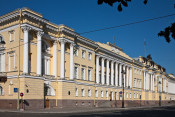
Features of Russian domestic policy in Central Asia in the 18th-19th centuries spotlighted at the Presidential Library
The Presidential Library hosted an international online seminar “Central Asia at the Crossroads of European and Asian Political Interests: 18th – 19th Centuries”, which was held within the framework of the “Central Asia in International Relations of the 18th – 19th Centuries” project supported by the Russian Science Foundation. The meeting focused on the features of Russian domestic policy in Central Asia as an example of the interaction of the imperial center with its outskirts.
Scientists, postgraduates and students from St. Petersburg, Moscow, Yekaterinburg, Elista, Abakan, Orenburg, Simferopol, as well as experts from Kazakhstan, Kyrgyzstan and Uzbekistan took part in the event via the video-conferencing mode.
The features of the policy of the Russian Empire in a special region of Central Asia - Mangystau (Mangyshlak), which had an important geopolitical significance and functioned as a large trade center, were discussed ate the seminar. The issues of the policy of the Russian Empire in the Turkestan Territory and the topic of the development of the Trans Caspian Territory were highlighted.
In addition, the experts revealed the features of Russian policy towards the Kirghiz of the Tien Shan and Eastern Pamirs, turned to the topic of monocultures in the economy of Russian Central Asia, which is new for modern Russian historiography, and discussed the issue of a significant political task of the Russian Empire at that time - collecting information on public sentiments of residents of the Central Asian region.
Scientists, postgraduates and students analyzed the issues of the Russian peasant colonization of Turkestan in the context of the geopolitical organization of the region in the second half of the 19th - early 20th centuries and Russian legislation of the early 20th century in relation to the Turkestan Territory and the steppe regions, the main administrative problem of which was the low efficiency of the existing management systems.
Each presentation at the seminar reflected the features and dynamics of the policy of the Russian Empire in Central Asia. The discussion showed the relevance and novelty of the topics raised and helped to outline further ways of solving the scientific problems posed.

